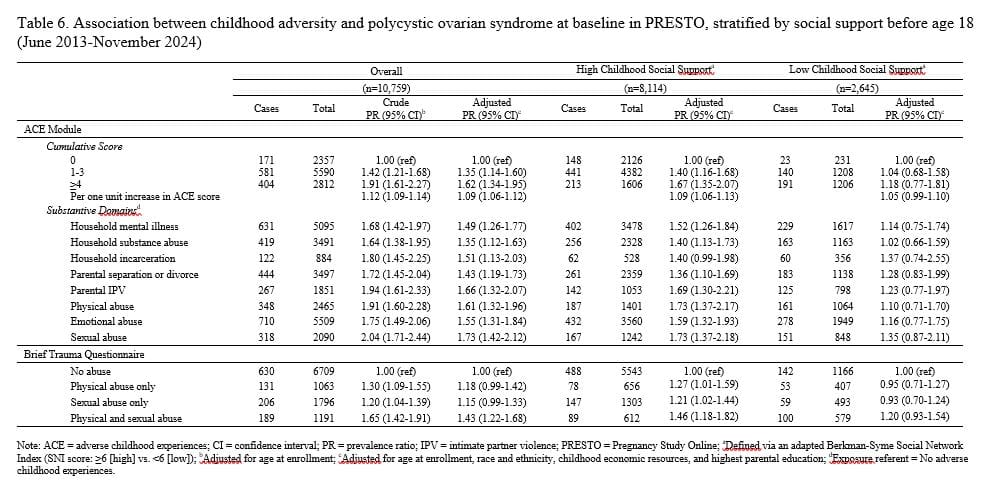Social
Adverse childhood experiences and lifetime risk of polycystic ovarian syndrome Lauren A. Wise* Lauren A. Wise Krystal E. Kuan Yael I. Nillni Julia C. Bond Andrea S. Kuriyama Nyia Noel Renée Boynton-Jarrett
Background: Adverse childhood experiences (ACEs) have been associated with several health outcomes, but their effects on reproductive disorders such as polycystic ovarian syndrome (PCOS) are not well characterized. ACEs may influence PCOS risk via chronic activation of the hypothalamic-pituitary-adrenal axis, thereby resulting in ovarian dysfunction.
Methods: We assessed the association between ACEs and PCOS risk using data from Pregnancy Study Online (PRESTO), a North American preconception cohort study of female pregnancy planners aged 21-45 years. At baseline, participants completed the 8-item ACE scale from the Behavioral Risk Factor Surveillance System module. We summed across all ACE items to create a score (range: 0 to 8). Participants reported PCOS diagnoses on baseline and follow-up questionnaires. We fit log-binomial regression models to estimate risk ratios (RRs) and 95% CIs, adjusting for age, race, ethnicity, and childhood socioeconomic position.
Results: Among 10,759 participants, 52% reported 1-3 ACEs and 26% reported ≥4 ACEs; 10.7% reported a PCOS diagnosis. RRs for ACE scores of 1-3 and ≥4 (vs. 0) were 1.35 (95% CI: 1.14-1.60) and 1.62 (95% CI: 1.34-1.95), respectively (per 1-ACE increase: RR=1.09, 95% CI: 1.06-1.12). Individual ACE items associated with the largest increase in PCOS risk included: household mental illness (RR=1.49, 95% CI: 1.26-1.77), incarceration of a household member (RR=1.51, 95% CI: 1.13-2.03), parental interpersonal violence (RR=1.66, 95% CI: 1.36-2.07), physical abuse (RR=1.61, 95% CI: 1.32-1.96), emotional abuse (RR=1.55, 95% CI: 1.31-1.84), and sexual abuse (RR=1.73, 95% CI: 1.42-2.21).
Conclusions: In a North American preconception cohort study, greater exposure to ACEs was associated with a higher lifetime risk of PCOS diagnosis.

